Social Care Publications
Publications, mainly written by Hermetica, to assist councils to commission better
If the Department of Health withdrew any of these publications, such as the one on Contracting for Outcomes which conflicted a little bit with other policies, it is noted. Double clicking on the picture will take you to the version stored under this web site which is watermarked as an "Unofficial copy". If the publication is still available on another external web site then double clicking on the title will take you to the original at that location, if not to the local version. Apologies if different versions are stored remotely and locally or if the external link becomes broken.
Please note that the website terms and conditions apply to these documents. No liabilities for their use are accepted whatsoever.
Commissioning tool-kit and East of England council collaboration
Originally intended to be a much larger tool-kit, the following publications represent the work done towards this objective. Work stopped on it when the Department of Health started to increase its focus on commissioning independently of CSED. However, some of the following publications are still in use. In the context on maintained pressure on public sector spend, some of the others may still contain nuggets which may proove useful.
-
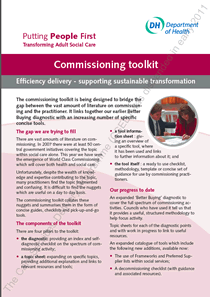
Commissioning toolkit
(original brochure)
This brochure summarises the status of the tool-kit at the time. More work was done but not published.
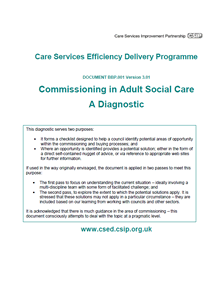
Commissioning in Adult Social Care,
A DiagnosticNot just applicable to adult social care, this is a useful and comprehensive tool, developed alongside councils, for evaluating commissioning opportunities.
-
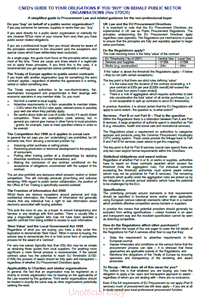
Buying Obligations in the Public Sector
Subsequent legislation may have changed this, but at the time it was reviewed by OGC. This was designed to provide a concise single A4 guide for the many non-professional public sector "buyers" out there.
-
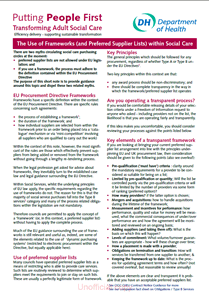
Frameworks & preferred supplier Lists
Again it is possible this has been superceded by law. However this followed the single A4 sheet principle in terms of correctly applying the concept of frameworks within the context of preferred supplier lists.
-
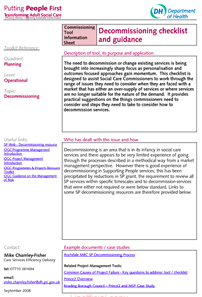
Decommissioning checklist & guidance
A copy of this is still available via the navca website (click on the title above and scroll down the page about half way). As stated by navca "many of the questions posed are generic and will be applicable in other areas"
-
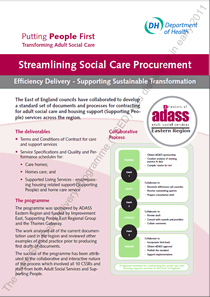
Streamlining Social Care Procurement
Whilst at CSED, Hermetica worked with the East of England councils to develop regional contract and supplier performance management standards for the region (the first time such collaboration had been successful). The standards are available via the website linked to the title (the brochure via the picture).
Internal vs External tool-kit
The Internal vs External tool-kit was published to help councils perform a robust and thorough analysis of whether to "make or buy" social care services. Whilst some elements of the tool-kit are specific to social care, much of it is generic. With foundations based on Hermetica's previous outsourcing experience, it was adapted to public services with the help of councils (mainly within the South East region). Whilst the main document can be found on various web-sites, this is the only place where the complete tool-kit is intact.
-
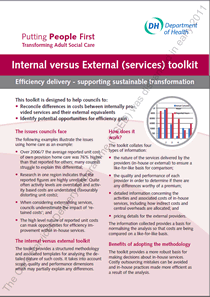
Internal vs External brochure
This brochure provides an overview of the tool-kit. It also provides an interesting insight into the amount of time carers can spend travelling (even in a relatively small town which provides the basis for this analysis).
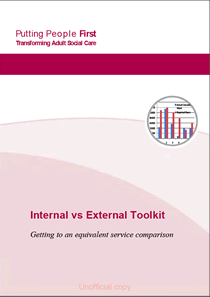
Internal vs External toolkit
This document includes the toolkit itself. Whilst it has been customised for social care services, the principles apply to any service. In one council it was successfully adapted to apply to transport services, for example.
-
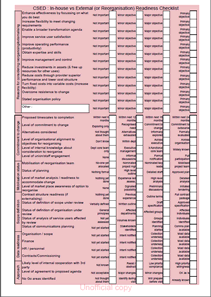
Internal vs External Readiness checklist
This is actually a generic checklist for any type of reorganisation and is designed to ensure / capture issues which may affect the extent to which any re-organisation can be progressed (it is also contained in the full tool-kit).
-
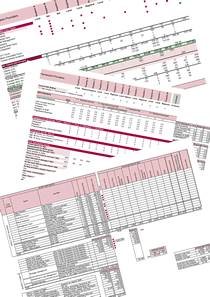
Assessment of Homecare Services
This provides a larger, more legible, pdf version of some of the templates included in the toolkit, customised to homecare services. The principles remain the same for any service, but clearly these templates would have to be adapted (as they were in one council for transportation services).
Social Care Reporting (PSS EX1), TRACS and TRIPS
In 2008 John Bolton requested a review of the PSS EX1. Nick Miller, Stan Hesketh and myself worked together to come up with proposals, consult with councils and recommend changes to the return. This linked into work being done in parallel on an analytical solution called TRACS (Tool for Rapid Analysis of Care Services) which provided councils with a means to analyse their own care management data in more detail. TRACS led to a more ambitious solution, Transforming Raw Information in Public Services (TRIPS) which extended this solution to cover other nationally collected data sets and provide Use of Resources type analysis for councils. The East Midlands councils, led by Derbyshire, agreed to support the pilot. The following publications cover all of these topics
-
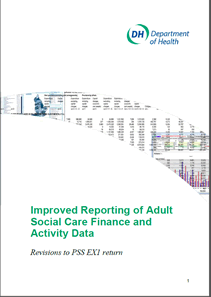
Improved Reporting of Adult Social Care Finance and Activity Data
The official version of this document is available from the CIPFA website (linked via the title). Based on a quick scan of the web, this work looks to be being superceded by the Towards Excellence in Adult Social Care Programme although this seems to have gone quiet since the middle of 2013.
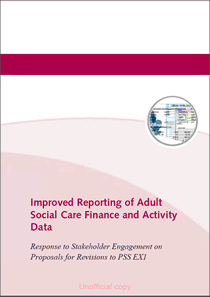
Improved Reporting of Adult Social Care Finance and Activity Data: Response
This document provided feed-back to councils based on their collective input and comments from other affected organisations (such as the NHS Information Centre). It was this document which led to the actual changes to the return
.-
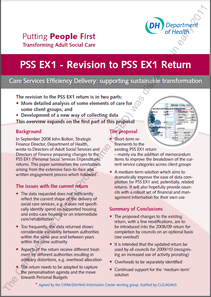
PSS EX1 - Revisions to the Return
This brochure summarised the changes to national reporting arising from the national consultation process covered by the above documents.
-
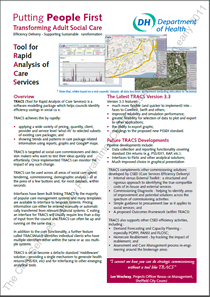
Tool for Rapid Analysis of Care Services
This 4 page brochure provides a summary of the first tool, developed by Hermetica, to analyse social care spend. Whilst TRACS was implemented in 50 councils it was too complex to stay embedded. More documentation may be found under tools.
-

CIPFA Social Care Panel
Following on the PSS EX1 national return work, the Department of Health authorised a small team to propose a successor to TRACS. This presentation, one of a number, was an overview, prepared for the national social care panel, expanding on the idea.
-
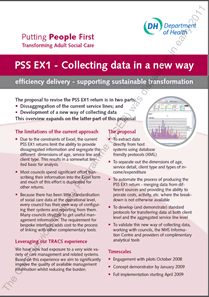
PSS EX1 - Collecting data in a new way
Following endorsement that it was an idea worth exploring further, CSED produced a two page brochure summarising the concept and plans for implementation. By this time work had already started on the project (albeit just Hermetica at the time).
-
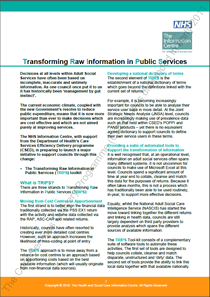
Transforming Raw Information in Public Services (TRIPS)
By 2010, the idea had developed sufficiently for the NHS Information Centre to start becoming involved. The East Midlands agreed to implement the idea, on a pilot basis, under a more rigorous project regime.
-
Improving Management Information in Adult Social Care in the East Midlands
The pilot completed its work in 2011. A comprehensive "Lessons Learnt" document was published for national use. The software was made available nationally on a licence free basis. See the tools section for more details.
One-to-One Services and Commissioning for Outcomes
During its time at CSED, Hermetica argued the case for a much radical approach to delivering social care services, particularly homecare, than had previously been proposed. At the time, for every £1 spent on front-line care, £2 was spent on administration and overheads. Some of the reason for this is covered under the Internal vs External toolkit documented above. The idea was simple - get rid of the bureucracy and replace it with an eBay style marketplace. This idea was shared with the South East region and, in combination with other emerging offerings (e.g. Shop4Support), the "Carebay" concept started to take off (although in a less radical form). This linked into working with some providers to develop an outcomes based approach to measurement. This was influenced heavily by the InterRAI approach used in many other countries. The commerical spin on this idea, based on experience elsewhere, conflicted with other DH policies and the related paper was withdrawn.
-
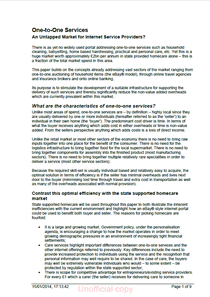
One-to-One Services
Although never formally published, the attached document was written in an attempt to explain the idea, and the rationale for it, to others. This idea led to some of the other related work which was published.
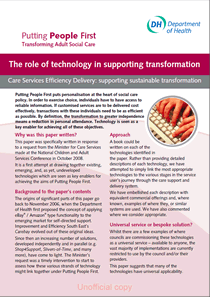
Role of Technology in supporting PPF
Originally written for minister attention, this publication attempted to summarise to role (current and potential) of technology in supporting the objective to "put people first". It refers to other related CSED initiatives and known initiatives by councils at the time.
-
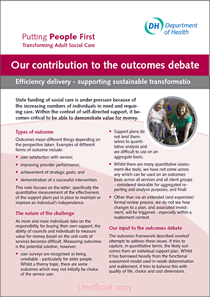
Our contribution to the outcomes debate
This questionnaire was developed with help of providers. Whilst not used nationally, one of these providers (a major residential home provider) adapted the approach for their use. I understand it, or a derivative is still in use.
-
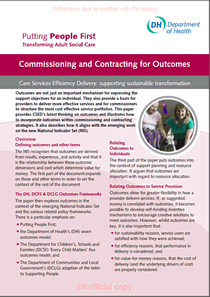
Commissioning/contracting for outcomes
WITHDRAWN due to conflict with other DH policies. Whilst withdrawn, this publication was developed with the help of commercially minded councils. At the time it had too much bias toward this direction - who knows, maybe some of the ideas are now more valid.
Value Stream Mapping and Other Publications
In the early years at CSED Hermetica applied value stream mapping techniques to both community equipment services and the assessment and care management (ACM) process. This evolved out of a regional engagement process which was subsequently rolled out nationally..
-

CSED Regional Engagement Process
This document is included to illustrate the thought that went into gaining stakeholder support for the CSED engagement process.
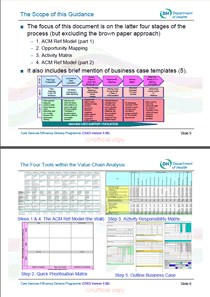
Value Chain Analysis (ref model, etc)
This is a fairly extensive document describing in detail the value stream mapping approach applied, in a number of councils, to the assessment and care management process. It is a general approach which can be adapted to any process or supply chain.
-
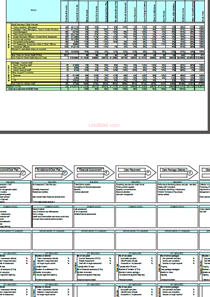
Value Chain Analysis Templates
Full size versions of some of the templates used in the Value Chain Analysis approach.